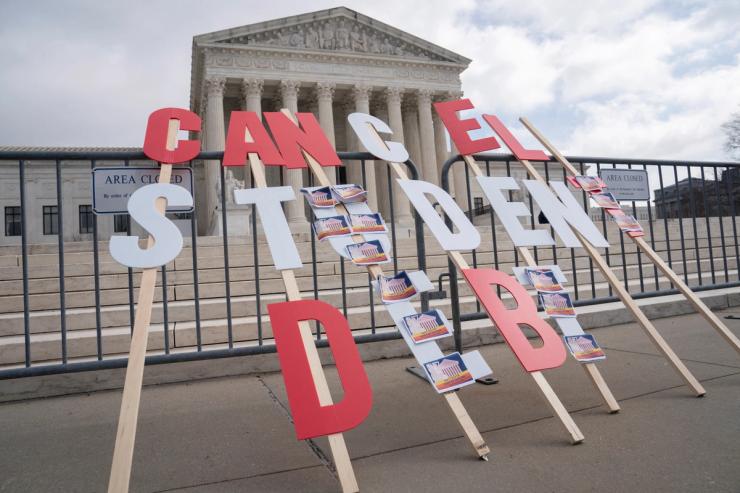The News
The U.S. Supreme Court on Friday struck down President Joe Biden’s massive student debt forgiveness plan, which would wipe up to $20,000 in debt for millions of borrowers.
With a 6-3 decision split on ideological lines, the court’s conservative majority sided with six GOP states that had argued the White House had overstepped its legal authority. Justices Elena Kagan, Sonia Sotomayor, and Ketanji Brown Jackson of the high court’s liberal wing dissented.
The White House argued it was acting legally under the 2003 HEROES Act, which allows the Department of Education to “waive or modify” student loan programs in response to a national emergency.
“The Secretary asserts that the HEROES Act grants him the authority to cancel $430 billion of student loan principal. It does not,” Chief Justice John Roberts wrote as the main author of the opinion.
The decision deals an enormous blow to a signature piece of Biden’s economic agenda that was a key component of his 2020 presidential campaign. The student loan cancellation program was set to provide financial relief for individual borrowers earning below $125,000 and $250,000 for households.
We’ve curated smart analysis on the far-reaching impact of the Court’s decision.
Insights
- The impact of the ruling will be far-reaching. The approximately 26 million Americans who applied for loan forgiveness will have to pay their balances in full. About half of them would have seen their student debt loans fully canceled under Biden’s plan.
- Friday’s decisions reinforced the ideological divide on the court, following some other decisions this term in which liberal and conservative justices aligned with one another.
- Democrats widely denounced the ruling, with Sen. Ron Wyden of Oregon criticizing what he called a “far-right extremist Supreme Court.” Even before the decision, progressives and advocacy groups had been pressing the Biden administration to pursue a Plan B if needed. Rep. Alexandria Ocasio-Cortez on Friday called on officials to try the cancellation effort again under the Higher Education Act, through which the government could theoretically order the Department of Education to stop collecting student loan payments.
- Republicans, meanwhile, cheered the ruling, having long contended that Biden overreached with the sweeping cancellation. Sen. Pete Ricketts of Nebraska, one of the states that sued to stop the plan, called it an “illegal scheme” that was unfair to those who have paid off their student loans.
- The political ramifications of the ruling remain to be seen. Semafor’s Benjy Sarlin points out that it’s an open question whether those who are denied debt relief will be “motivated to vote in response and who they blame.”
Know More
Biden’s plan has been in legal limbo for months after a barrage of lawsuits, including from six GOP-led states, sought to overturn it. Conservative advocates claimed the White House couldn’t take sweeping executive action without buy-in from Congress.
The conservative justices had expressed skepticism over the forgiveness plan, while progressive groups argued the states had failed to show they’d been harmed by it.
In a separate case in which individual borrowers challenged the plan, the court ruled unanimously that they did not have standing to bring the suit, meaning they failed to prove they’d be harmed by the policy.
Meanwhile, the Education Department announced that it’ll restart student loan repayments in October with interest accruing starting Sept. 1.

